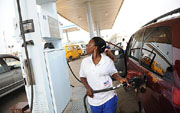VOA标准英语2012--Nigerian Students Threaten Massive Protests Over Fuel Price Increase
搜索关注在线英语听力室公众号:tingroom,领取免费英语资料大礼包。
(单词翻译)
Nigerian Students Threaten Massive Protests Over Fuel Price Increase
Fuel prices in Nigeria more than tripled in some areas of the country this week after the government announced an end to the fuel subsidy1. Iny Ememobong, a spokesperson for the National Association of Nigerian Students, says filling stations in the southern town of Yuo have become overwhelmed with demand for fuel due to price uncertainty2.
“The public holiday has become nightmarish because there are long queues of fear. There is a lot of annoyance3 in the mind of people. People can’t move around happily, you know. People are annoyed. People are angry,” he says.
Adding to the confusion is the wide variation in new fuel prices says Ememobong. With the subsidy, prices were an average of 65 Naira, or 40 cents per liter, now they have increased to as much as 250 Naira in some places.
“It’s a free for all. The marketers are obviously extorting4 money from the buyers because there’s nothing you can do. Some places are selling for 150. I just bought for 200 Naira. On Facebook I have friends who have said they bought for 250 Naira. From 65 Naira to 200 naira you can’t imagine,” Ememobong says.
The student association as well as other groups throughout the country will stage massive protests if the subsidy is not reinstated.
“Labor5 is going on protest, students are going on protest, market women - everybody’s going because everybody is affected6 by what’s happening. It’s not just about students. It’s not just about labor. It’s about everybody. All of Nigeria except the very rich are going on protest. And like John F. Kennedy said, if a free society cannot help the many who are poor, it cannot save the few who are rich,” Ememobong adds.
 |
| A fuel attendant fills a tank at a gas station on Lagos' Ibadan highway where new pump prices were implemented7. Queues formed at petrol stations, protests broke out and unions threatened to paralyze Nigeria over a deeply controversial measure that has more than doubled pump prices, January 2, 2012. |
Despite being Africa’s largest oil producer, Nigeria imports most of its refined petrol while exporting its crude resources – a fact that speaks to capacity in Nigeria, says Ememobong.
“It’s unfortunate that we have many refineries8 in Nigeria that are not even working at optimal9 capacity. Why can’t they work? Why do we need to export the crude oil and re-import them and pay so much on them?”
The Nigerian government says the $7.5 billion used on fuel subsidies10 is needed for infrastructure11 projects and social programs throughout the country.




